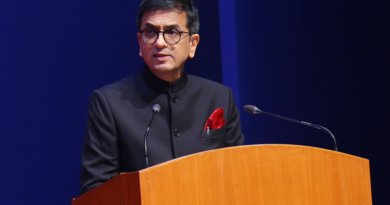Justice Suryakant Slams Hypocrisy: ‘How Can Excessive Force Champion Human Rights?
(Syed Ali Taher Abedi)
Addressing a distinguished international audience at the Embassy of India in Sweden, Supreme Court Justice Suryakant highlighted India’s enduring commitment to human rights—one deeply embedded in its constitutional framework and civilizational heritage. He underscored that India upheld these principles long before the global discourse around human rights gained momentum.
Speaking at an event themed “Human Rights, the Indian Constitution, and India as a Resilient Power,” Justice Suryakant reflected on the paradox confronting the global human rights narrative. He pointed to countries that maintain rigid immigration policies and frequently resort to excessive force—even for minor infractions—while simultaneously positioning themselves as champions of human rights. Such posturing, he argued, risks undermining the very values these nations claim to uphold, especially when criticism lacks introspection or contextual understanding.
Justice Suryakant emphasized that every nation develops its approach to human rights and crisis management through the lens of its unique legal traditions, socio-political realities, and cultural ethos. “Progress lies not in uniformity,” he stated, “but in mutual understanding, where each nation is afforded the dignity of its own path, shaped by both heritage and contemporary responsibility.”
He affirmed India’s firm commitment to strengthening its human rights infrastructure and evolving an empathetic response to the refugee crisis—a challenge of global magnitude. While the international community grapples with issues of displacement, identity, and protection, India’s roots in a civilization that venerates compassion, dignity, and refuge guide its approach.
Justice Suryakant said that India continues its effort to harmonize traditional governance systems with contemporary, rights-based democratic principles.
Opening his lecture with a light-hearted remark on coffee culture across continents, he drew comparisons between Sweden’s student-oriented fika sessions, India’s Coorg expressos, the hospitality-based brews of France, and the sweet intensity of Vietnamese coffee. “Coffee,” he noted, “seems to be a near-universal experience, yet it’s one profoundly shaped by local customs and histories.” He likened this diversity to the human rights frameworks across countries—each informed by distinct legal, cultural, and economic contexts.
Justice Suryakant then explored the historical evolution of human rights in India. In the Vedic era, the concept of Dharma encompassed duties, rights, and moral responsibilities within a cosmic order. During early Islamic rule, he acknowledged the challenges posed by conquest and discrimination, but also highlighted the later periods under emperors Akbar and Jahangir as marking significant advancements—introducing ideas akin to due process, religious tolerance, and legal reform.
He described colonial rule as a dark chapter, marked by systematic economic exploitation, cultural suppression, and political subjugation. However, with the birth of the Indian Constitution, human rights gained fundamental stature. The judiciary, he asserted, serves as a vigilant guardian, ensuring that neither legislature nor executive oversteps constitutional boundaries.
Justice Suryakant praised the proactive role played by the Indian judiciary in interpreting and expanding the scope of fundamental rights—transforming constitutional guarantees into an evolving and dynamic human rights framework. Through mechanisms such as Public Interest Litigation (PIL), any individual or group may approach courts to redress public grievances, showcasing India’s inclusive legal structure.
He commended the judiciary’s swift cognizance of pressing human rights concerns and its issuance of binding directives and orders to government institutions. He also underscored the significance of the Protection of Human Rights Act, 1993, which established National and State Human Rights Commissions. These bodies, he noted, not only serve as forums for grievance redressal but also function as essential instruments for systemic reform and accountability, further reinforcing India’s commitments under international conventions like the ICCPR and ICESCR.



